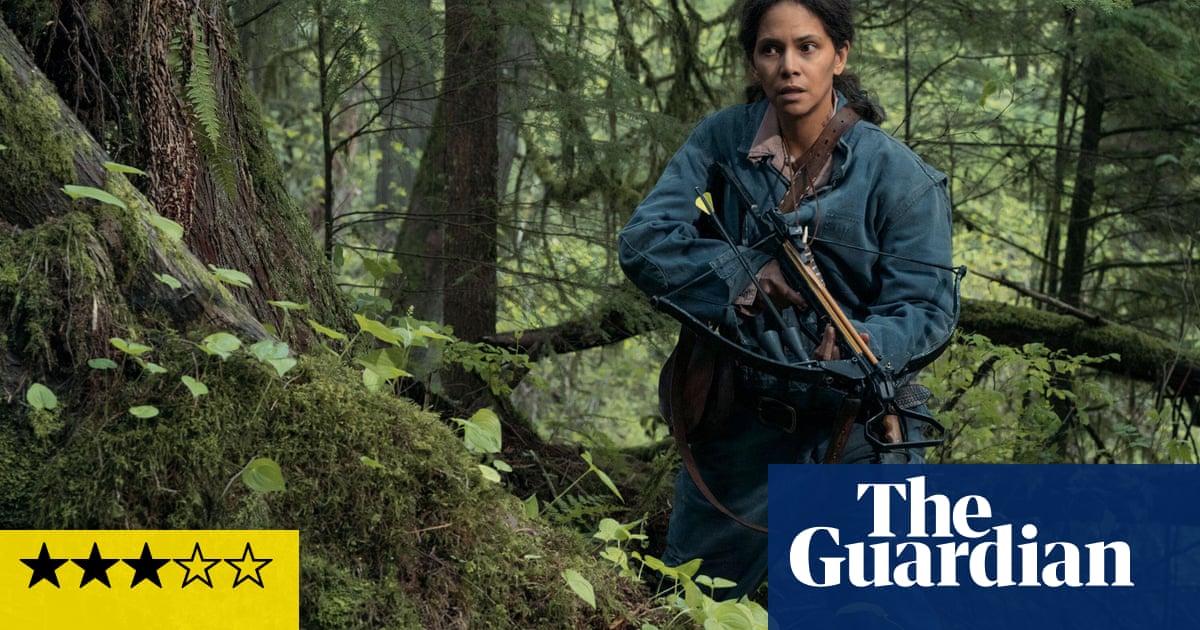
There’s something nasty down in the woods again, just months after a deranged killer, some deranged fairies and a deranged attempt to resurrect IP all re-reminded us to steer well clear. In Alexandre Aja’s diverting yet overly derivative new horror Never Let Go, Halle Berry is a mother trying to keep her twin sons safe in a post-apocalyptic hellscape, hidden from whatever is left of the wider world. There are exhaustive rules told in an exhausting fashion, the most important of which is to never leave their remote shack without a rope attached, maintaining a connection with the holiness of home at all times. If they find themselves untethered then they’re at the mercy of a malevolent and inventive evil that will consume them.
But it’s an evil that only she can see, telling the boys that they will only see it when they get older, a caveat that starts to grow a seed of suspicion in the mind of Nolan (Percy Daggs IV, an excellent newcomer), the less unquestionably loyal of the pair, who faces opposition from brother Samuel (Anthony B Jenkins). As food starts to dwindle (a dinner of fried bark bits is an undeniable low point) and tensions starts to rise, the fraught family dynamic is put to the test.
It’s easy to get distracted while watching Never Let Go, the instinct to list the many films it recalls becoming increasingly hard to suppress. There’s bits of Bird Box, 10 Cloverfield Lane, The Babadook, The Village, Goodnight Mommy, Retreat and A Quiet Place among many others, and the film exists in both the recent trend for pandemic-era isolation thrillers as well as the subgenre of horrors that are unsubtly allegorical. It’s a film about a mother trying to stop her sons from leaving home, protecting them from the monsters that exist outside while also maybe putting them at risk of being hurt by those that live inside too. It’s possibly about a number of things – the curse of inherited mental illness, the suffocation of helicopter parenting, the fear of releasing Black sons into a brutal, racist world – a stew of ideas bubbling that leads us to believe this isn’t just a lazy retrace.
When the film exists in the space between guessing and knowing, there’s a real allure here. Once the inelegance of the scene-setting is over, there’s genuine tension in trying to figure out where the real danger comes from and watching children forced into adult thinking. Aja, whose Hollywood films have tended to be more miss (Mirrors, Horns, The Hills Have Eyes, The 9th Life of Louis Drax) than hit (Crawl, Piranha), leans into some efficiently nightmarish nastiness, showing us early that the monsters that plague Berry find devious ways to haunt her. She sees a grotesque version of her dead mother or a vision of her dead sons or a giant circling snake and an on-edge Berry is fierce and persuasive as a mother trying to balance her personal fear with her need to stay strong in front of her children.
A crescendoing scene involving the family dog offers some genuine edge-of-seat suspense but it also signals the point when the film starts to fall apart. It’s followed by a major, gasp-insisting shock which sadly sucks the air out of the final act, leaving a messy finale of cascading puzzle pieces failing to fall into place. What had felt intriguing becomes utterly confusing and one starts to mourn the heyday of Shyamalan when he could craft a genre ending that was earned and explained enough to convince us.
Aja can’t find a way to balance the film’s stark seriousness – redundant gothic chapter titles, a glum and grimy worldview, grounded scenes of abuse – with the goofier and gloopier creature feature elements. He’s never quite sure if he wants to trick us with a jump scare or make us ponder weightier issues and, unable to do both efficiently, the film becomes lost in the murk in-between. Berry is, as ever, a strong anchor but by the time the credits roll, we’re ready to let go.
-
Never Let Go is out in US cinemas on 20 September and in the UK on 27 September
Source: theguardian.com





















